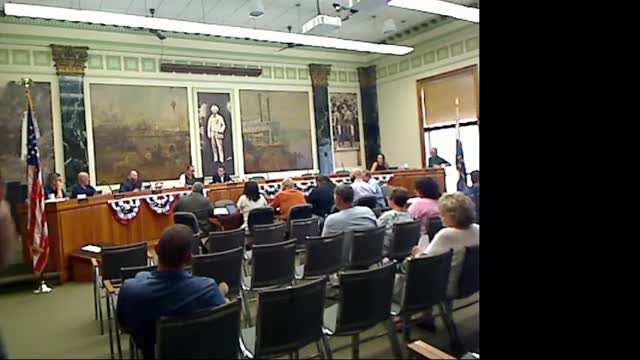Utility Board Approves 12.5 Percent Rate Hike Amid Public Concerns
June 28, 2025 | Hannibal City, Marion County, Missouri
This article was created by AI summarizing key points discussed. AI makes mistakes, so for full details and context, please refer to the video of the full meeting. Please report any errors so we can fix them. Report an error »

In the heart of Hannibal, Missouri, a recent city council meeting illuminated the growing concerns of residents regarding rising utility costs. As council members gathered under the bright lights of city hall, the atmosphere was charged with urgency and frustration, particularly surrounding a proposed 12.5% increase in utility rates set to take effect on October 1.
Councilman Paul voiced the worries of many constituents, expressing that the increase, which could lead to a staggering 30% rise in utility bills over the next 18 months, has left citizens anxious about their financial futures. “The amount of citizens that have contacted me in fear because they’re afraid they’re not gonna be able to afford it is insane,” he stated, emphasizing the emotional toll these rising costs are taking on families.
The discussion revealed a critical distinction: the proposed rate hike is not a tax increase but rather a decision made by the Board of Public Works, which does not require a public vote. This nuance sparked further debate among council members about the implications of such decisions on the community. “We can’t go out and increase the taxes every time we need to give our employees a deserved raise,” one member pointed out, highlighting the challenges of balancing employee compensation with the financial strain on residents.
As the meeting progressed, it became clear that the council is grappling with the dual responsibility of supporting city employees while also addressing the concerns of ratepayers. The tension between these priorities reflects a broader struggle faced by municipalities across the nation, where rising operational costs often lead to increased fees for residents.
In the wake of these discussions, the council's commitment to transparency and communication with the community will be crucial. As residents brace for the impending rate hike, the council's ability to provide clear answers and support will be vital in navigating this challenging landscape. The meeting concluded with a sense of urgency, as council members recognized the need to address the fears of their constituents while ensuring the sustainability of city services.
Councilman Paul voiced the worries of many constituents, expressing that the increase, which could lead to a staggering 30% rise in utility bills over the next 18 months, has left citizens anxious about their financial futures. “The amount of citizens that have contacted me in fear because they’re afraid they’re not gonna be able to afford it is insane,” he stated, emphasizing the emotional toll these rising costs are taking on families.
The discussion revealed a critical distinction: the proposed rate hike is not a tax increase but rather a decision made by the Board of Public Works, which does not require a public vote. This nuance sparked further debate among council members about the implications of such decisions on the community. “We can’t go out and increase the taxes every time we need to give our employees a deserved raise,” one member pointed out, highlighting the challenges of balancing employee compensation with the financial strain on residents.
As the meeting progressed, it became clear that the council is grappling with the dual responsibility of supporting city employees while also addressing the concerns of ratepayers. The tension between these priorities reflects a broader struggle faced by municipalities across the nation, where rising operational costs often lead to increased fees for residents.
In the wake of these discussions, the council's commitment to transparency and communication with the community will be crucial. As residents brace for the impending rate hike, the council's ability to provide clear answers and support will be vital in navigating this challenging landscape. The meeting concluded with a sense of urgency, as council members recognized the need to address the fears of their constituents while ensuring the sustainability of city services.
View full meeting
This article is based on a recent meeting—watch the full video and explore the complete transcript for deeper insights into the discussion.
View full meeting
